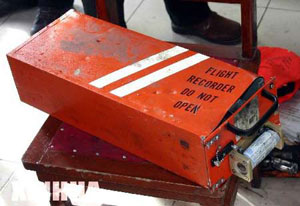飞机失事后经常被提及的一个词就是“黑匣子”。这个事实上为橙色的“黑匣子”是用来记录飞机飞行过程中一些重要数据的工具,通过里面记录的相关数据,调查人员可以分析出失事原因。

Black boxes - which are actually orange - are a group of data collection devices mounted in the tail of an aircraft.
Under internationally agreed regulations, commercial aircraft must carry the equipment to record the performance and the condition of the aircraft in flight.
The recorders are housed in immensely strong materials, such as titanium, and insulated to withstand a crash impact many times the force of gravity, temperatures of more than 1,000 deg C for up to 30 minutes and the immense pressure of lying on the seabed.
One manufacturing test for data recorders involves firing them from a cannon into a wall to simulate an aircraft suffering a catastrophic crash landing while traveling at hundreds of miles an hour.
The recording material is itself insulated against accidental deletion and the corrosive effects of sea water.
Modern black boxes record up to 300 factors of flight including:
Airspeed and altitude
Heading and vertical acceleration
Aircraft pitch
Cockpit conversations
Radio communications
The safety precautions are designed to ensure, theoretically, that accident investigators will be able to recover the recorders, compile a full picture of an aircraft's last moments from the recordings and then accurately explain what went wrong.
Origins
Australia lays claim to the development of the flight recorder after one of its scientists dreamed up the concept following the birth of commercial jet aircraft in the 1950s.
In 1953, jet flight experts were struggling to understand why a number of Comet airliners had inexplicably crashed, throwing the entire prospect of commercial jet air travel into doubt.
A year later Dr David Warren, an Australian aviation scientist, proposed a flight recording device and by 1958 he had produced the prototype "ARL Flight Memory Unit".
That first version was slightly larger than an adult hand but capable of recording some four hours of cockpit conversation and instrument readings.
To Dr Warren's surprise, the device was at first rejected by aviation authorities as having "little immediate direct use in civil aircraft" while pilots described it as a "Big Brother" spying on their actions.
On taking the device to the UK, Dr Warren was enthusiastically received and, following a BBC report on the device, manufacturers came forward to take over the project.
Similar developments had by this stage also begun in the United States and by 1960 the first steps were being taken to make the devices mandatory.
Computers have now replaced magnetic tape, meaning the devices can record more data and are far more likely to survive an impact.
(来源:BBC 英语点津 Helen 编辑)
我要了解更多趣味百科知识